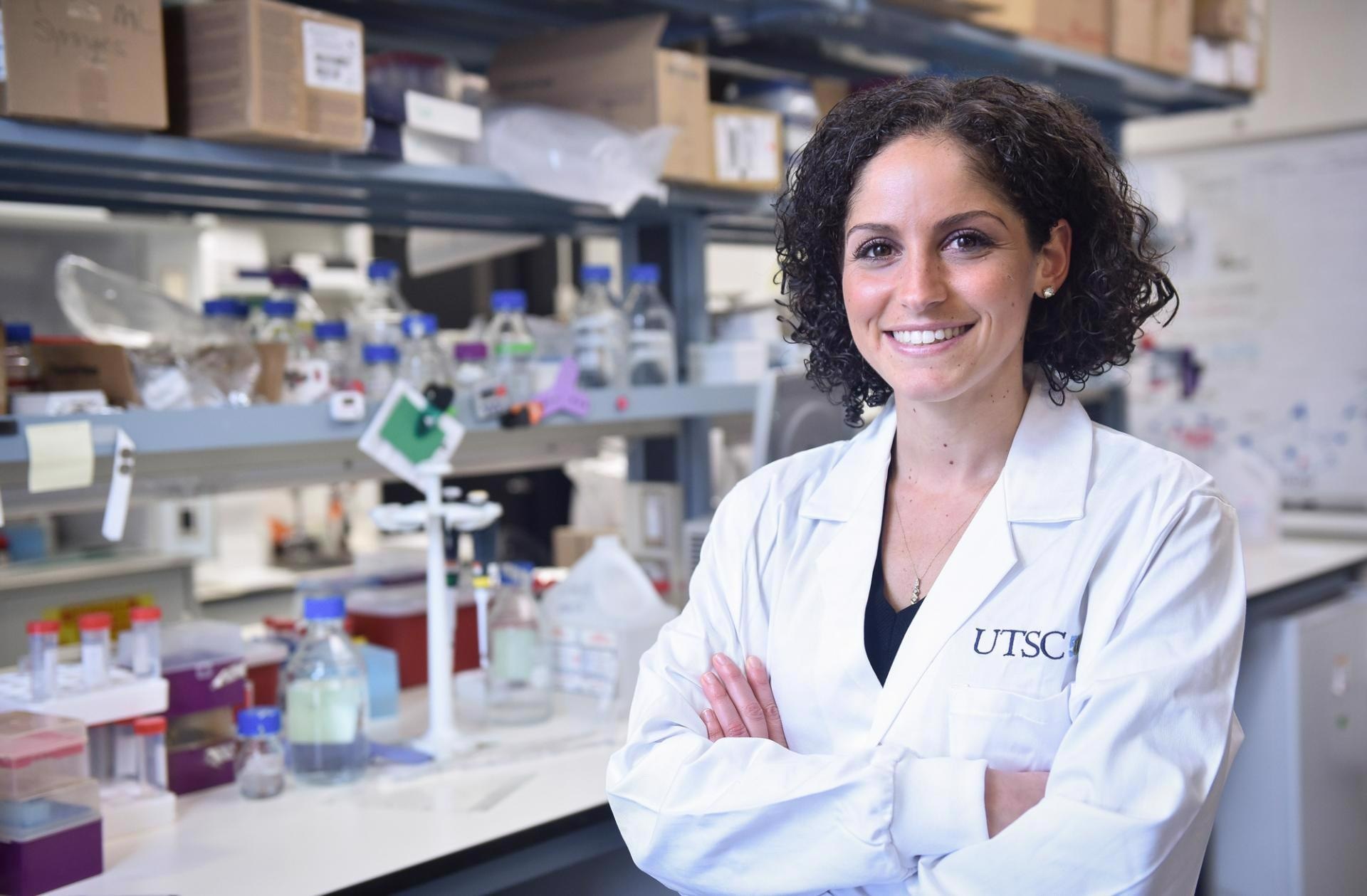According to a new study from the University of Toronto, Scarborough, the same light bulbs installed in public spaces and offices can destroy HIV and coronaviruses.
 Christina Guzzo conducted her research in the Guzzo Lab, a viral immunology lab at U of T Scarborough that focuses partly on HIV. Image Credit: Ken Jones.
Christina Guzzo conducted her research in the Guzzo Lab, a viral immunology lab at U of T Scarborough that focuses partly on HIV. Image Credit: Ken Jones.
Scientists destroyed both the viruses with the help of UV-LED lights, which can switch between decontaminating ultraviolet (UV) light and white light. With an inexpensive retrofit, they could also be installed in many basic lighting fixtures, offering them a “unique appeal” for use in public areas, states Christina Guzzo, the study’s senior author.
We’re at a critical time where we need to use every single possible stop to get us out of this pandemic. Every mitigation strategy that can be easily implemented should be used.
Christina Guzzo, Study Senior Author and Assistant Professor, Department of Biological Sciences, University of Toronto, Scarborough
UV lights destroy viruses via radiation. Guzzo, together with Ph.D. students Jonathan Burnie and Arvin T. Persaud, initially experimented with the lights on bacterial spores that are infamous for their resistance to this radiation (called Bacillus pumilus spores).
If you're able to kill these spores, then you can reasonably say you should be able to kill most other viruses that you would commonly encounter in the environment.
Christina Guzzo, Study Senior Author and Assistant Professor, Department of Biological Sciences, University of Toronto, Scarborough
The growth of the spores was reduced by 99% within 20 seconds of exposure to UV light.
The scientists then developed droplets comprising HIV or coronaviruses, to imitate the usual ways people are exposed to viruses in public, such as by sneezing, coughing and bleeding. The droplets were then placed under UV light and positioned in a culture to check if any of the viruses stayed active. With only 30 seconds of exposure, the ability of the viruses to infect reduced by 93%.
When the viruses were tested at various concentrations, they realized samples possessing more viral particles were more resistant to UV radiation. But even with a high viral quantity, Guzzo terms it “the worst-case scenario,” infectivity decreased by 88%.
Though it was not added to the study, Guzzo and her student team also compared UV light to two strong disinfectants used in laboratory research. They discovered that the lights were effective, in the same way, in their capacity to neutralize viruses.
I was really surprised that UV could perform on the same level of those commonly used lab chemicals, which we regard as the gold standard. That made me think, ‘Oh, my gosh, this is a legitimate tool that's really underutilized.’
Christina Guzzo, Study Senior Author and Assistant Professor, Department of Biological Sciences, University of Toronto, Scarborough
Balance UV's Pros and Cons with Clever Use, Researchers Say
A small percentage of the virus was still left active after exposure to the lights. Therefore, Guzzo borrows the “Swiss cheese model” to fight against COVID. Every approach to combat the dispersion has its flaws, but every layer is another opportunity to stop the spreading of the virus particles.
Repeated exposure to UV light is paramount in attacking all those missed particles. Fortunately, it is as easy as turning on a switch. It is also easier to replace a light bulb than an air filtration device. Guzzo observes that UV-LEDs are inexpensive and can be easily retrofitted in current light fixtures and that the bulbs have an extensive lifespan and are simple to preserve.
“You could disinfect in a way that wouldn’t be infringing on people’s enjoyment of that everyday ‘normal’ life that they long for,” Guzzo says.
The lights can also be automated. A uniform, germicidal quantity of light can be supplied each time, while the method of wiping down surfaces with antiseptics leaves room for manual mistakes. Chemicals and waste from these antiseptics also end up in landfills and watersheds as hands are washed and wipes disposed of.
Nevertheless, the lights are not harmless, and there is a reason for wearing sunglasses and sunscreen — UV radiation damages nucleic acid, and repeated, extended exposure is destructive. That is why Guzzo states the lights must be used when public spaces are unoccupied, such as empty buses that have completed their routes, or vacant elevators moving between floors.
Escalator handrails could be constantly sterilized by placing UV lights in the underground portion of the track, cleaning it with every rotation.
A Toronto-based start-up company, Safe Antivirus Technologies, Inc., which collaborated with Guzzo for the study, is creating exclusive UV-LED lighting systems. The lights fitted with motion sensors automatically change to UV light when a room is unoccupied, then switch back to the basic light mode when there is movement.
This study was financially supported by the Natural Sciences and Engineering Research Council (NSERC) Alliance COVID-19 Grant and was published in the Virology Journal.
This study emphasizes UV-LEDs as an instrument that could be used even after the pandemic, preferably to help stop another.
Worldwide events like the COVID-19 pandemic, as terrible as they are, hopefully can still be learned from. One thing we learned is that this is an underutilized tool we should think more about implementing.
Christina Guzzo, Study Senior Author and Assistant Professor, Department of Biological Sciences, University of Toronto, Scarborough
Christina Guzzo was the principal investigator at the Guzzo Lab.
Journal Reference:
Persaud, A. T., et al. (2022) A UV‑LED module that is highly effective at inactivating human coronaviruses and HIV‑1. Virology Journal. doi.org/0.1186/s12985-022-01754-w.